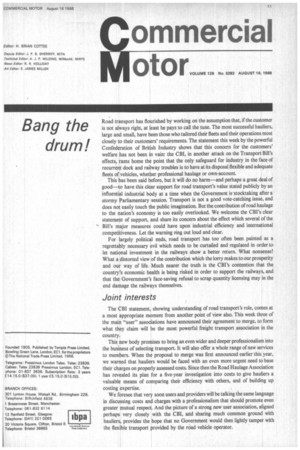Bang the drum!
Page 13

If you've noticed an error in this article please click here to report it so we can fix it.
Road transport has flourished by working on the assumption that, if the customer is not always right, at least he pays to call the tune. The most successful hauliers, large and small, have been those who tailored their fleets and their operations most closely to their customers' requirements. The statement this week by the powerful Confederation of British Industry shows that this concern for the customers' welfare has not been in vain: the CBI, in another attack on the Transport Bill's effects, rams home the point that the only safeguard for industry in the face of recurrent dock and railway troubles is to have at its disposal flexible and adequate fleets of vehicles, whether professional haulage or own-account.
This has been said before, but it will do no harm—and perhaps a great deal of good—to have this clear support for road transport's value stated publicly by an influential industrial body at a time when the Government is.stocktaking after a stormy Parliamentary session. Transport is not a good vote-catching issue, and does not easily touch the public imagination. But the contribution of road haulage to the nation's economy is too easily overlooked. We welcome the CBI's clear statement of support, and share its concern about the effect which several of the Bill's major measures could have upon industrial efficiency and international competitiveness. Let the warning ring out loud and clear.
For largely political ends, road transport has too often been painted as a regrettably necessary evil which needs to be curtailed and regulated in order to let national investment in the railways show a better return. What nonsense! What a distorted view of the contribution which the lorry makes to our prosperity and our way of life. Much nearer the truth is the CBI's contention that the country's economic health is being risked in order to support the railways, and that the Government's face-saving refusal to scrap quantity licensing may in the end damage the railways themselves.
Joint interests
The CBI statement, showing understanding of road transport's role, comes at a most appropriate moment from another point of view also. This week three of the main "user" associations have announced their agreement to merge, to form what they claim will be the most powerful freight transport association in the country.
This new body promises to bring an even wider and deeper professionalism into the business of selecting transport. It will also offer a whole range of new services to members. When the proposal to merge was first announced earlier this year, we warned that hauliers would be faced with an even more urgent need to base their charges on properly assessed costs. Since then the Road Haulage Association has revealed its plan for a five-year investigation into costs to give hauliers a valuable means of comparing their efficiency with others, and of building up costing expertise.
We foresee that very soon users and providers will be talking the same language in discussing costs and charges with a professionalism that should promote even greater mutual respect. And the picture of a strong new user association, aligned perhaps very closely with the CBI, and sharing much common ground with hauliers, provides the hope that no Government would then lightly tamper with the flexible transport provided by the road vehicle operator.




































































































